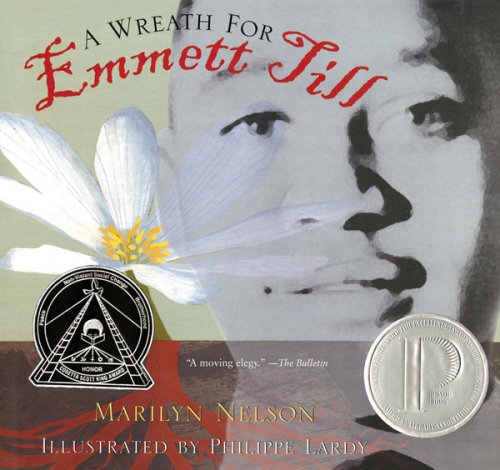 Five years ago, a remarkable book came into this world. A Wreath for Emmett Till, by Marilyn Nelson, illustrated by Philippe Lardy, is *a heroic crown of sonnets* relating the story and details of the murder of a fourteen-year old boy in Mississippi in 1955. He was lynched by a group of white men for (allegedly) whistling at a white woman, although it turns out that may not even have happened. Determined to make the world aware of not only her son's murder, but the racial inequities in the South at that time, his mother insisted on an open casket for her poor boy. Dead too soon, and yet he helped to spark the civil rights movement in the United States because so many folks, no matter what their color, were outraged by his death.
Five years ago, a remarkable book came into this world. A Wreath for Emmett Till, by Marilyn Nelson, illustrated by Philippe Lardy, is *a heroic crown of sonnets* relating the story and details of the murder of a fourteen-year old boy in Mississippi in 1955. He was lynched by a group of white men for (allegedly) whistling at a white woman, although it turns out that may not even have happened. Determined to make the world aware of not only her son's murder, but the racial inequities in the South at that time, his mother insisted on an open casket for her poor boy. Dead too soon, and yet he helped to spark the civil rights movement in the United States because so many folks, no matter what their color, were outraged by his death.*A heroic crown of sonnets* is a series of 15 poems using the sonnet form. The last line of the first sonnet becomes the first line of the second, and so on, until the end of the 14th sonnet. The 15th sonnet is composed of the first line of each of the 14 that came before it. It makes perfect sense, and, to highlight Nelson's further brilliance, includes an epitaph in an acrostic down the left-hand side of the final page.
Here is the poem attributed to the tree from which Emmett Till was hanged:
Pierced by the screams of a shortened childhood,Each of the poems is equally powerful. This is a book that packs a wallop.
my heartwood has been scarred for fifty years
by what I heard, with hundreds of green ears.
That jackal laughter. Two hundred years I stood
listening to small struggles to find food,
to the songs of creature life, which disappears
and comes again, to the music of the spheres.
Two hundred years of deaths I understood.
Then slaughter axed one quiet summer night,
shivering the deep silence of the stars.
A running boy, five men in close pursuit.
One dark, five pale faces in the moonlight.
Noise, silence, back-slaps. One match, five cigars.
Emmett Till's name still catches in the throat.
Read this one for the subject-matter, which is important. Read it to remember, and to experience the power poetry has to move you and transform you and to make you consider the many angles--the sonnets are told from varying perspectives, including the tree on which young Emmett was hanged, his poor mother, and the hypothetical life he could have led.
And if you are a poet, read it for the craft. The form itself is beautiful enough to make you weep.

No comments :
Post a Comment